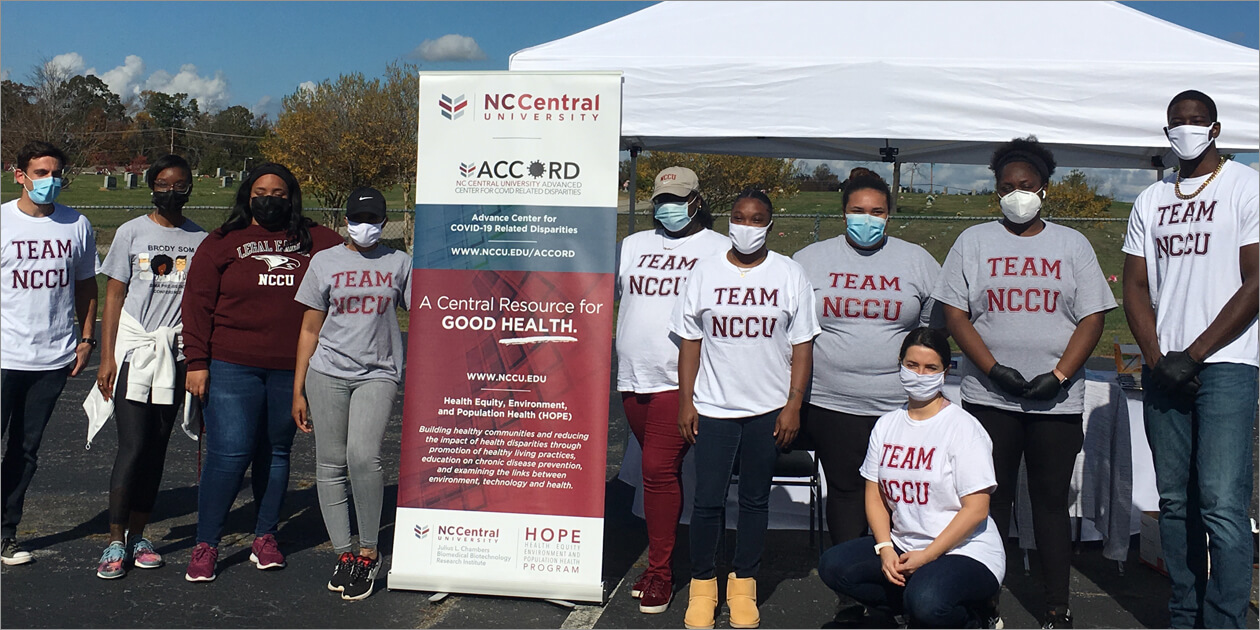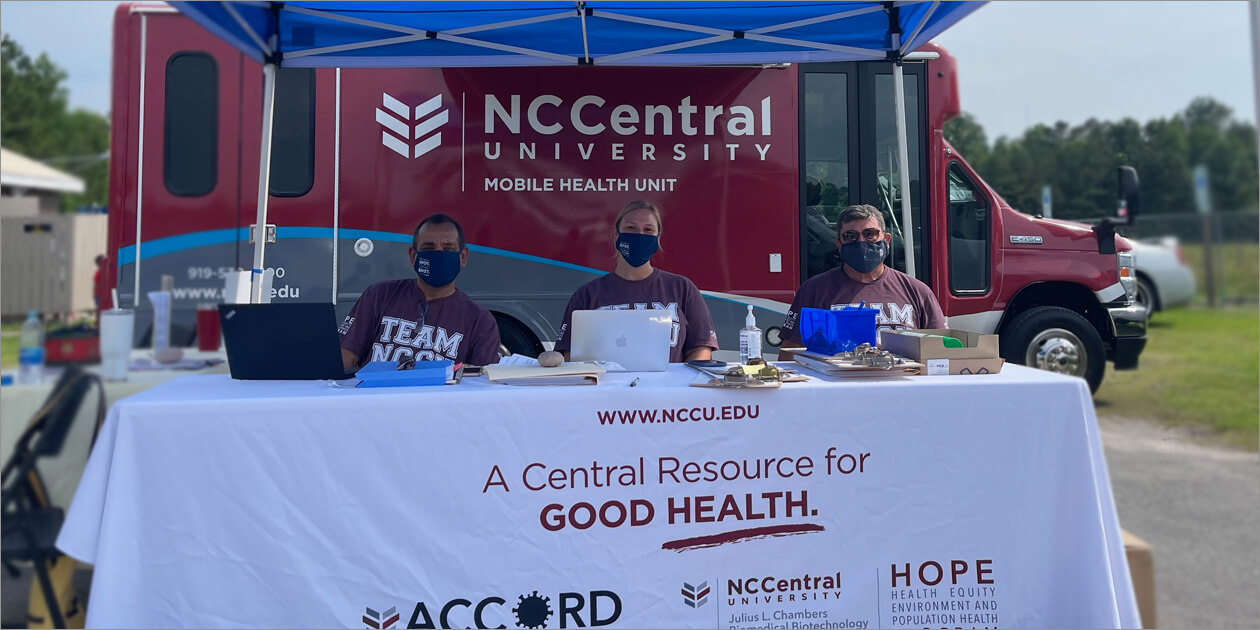North Carolina Central University Addresses COVID-19 Disparities in Rural North Carolina

When the COVID-19 pandemic began, Deepak Kumar, Ph.D., anticipated that rural North Carolinian communities would likely experience a disproportionate burden of COVID-19 and related impacts. He is the director of North Carolina Central University’s (NCCU) Biomedical/Biotechnology Research Institute and the Principal Investigator of NCCU’s Research Centers in Minority Institutes (RCMI) Center for Health Disparities Research (RCHDR). He has spent years partnering with community leaders and organizations in rural North Carolina to support the medically underserved.
“With COVID-19, it’s not necessarily just about health disparities for our communities,” he says, “but more so logistics and accessibility.” All of North Carolina’s counties are designated into one of three levels (PDF) of economic development. This tiered designation is based on unemployment rates, median household income, and other factors which determine what types of funding opportunities are available to assist in economic development. Tier 1 counties, the most economically distressed, are predominantly rural and have higher percentages of minority and underserved communities.
“As the pandemic began, nobody was really going out to these counties to assess what was happening,” Deepak says. “Few people were getting tested because testing wasn’t close to their homes. We knew we needed to engage with these communities on COVID-19 and we quickly realized that the North Carolina Department of Public Health was getting a different story than what we were seeing on the ground.”
Building from a Place of Trust
Dr. Kumar and the research community at NCCU, an Historically Black College or University (HBCU), leveraged the infrastructure and trust they had already established through their RCMI program to start assessing the impacts of COVID-19 in rural N.C. “People were happy to see that NCCU wasn’t coming just one time because of a grant or something else,” he says. “NCCU was perceived as coming because there was a need.”
In June 2020, NCCU was awarded $1 million from the North Carolina Policy Collaboratory at the University of North Carolina at Chapel Hill, with support from the North Carolina General Assembly and University of North Carolina Board of Governors’ Historically Minority Serving Institutions Committee. The money was used to establish the Advanced Center for COVID-19 Related Disparities (ACCORD), led by Dr. Kumar.
The ACCORD team began conducting COVID-19 testing and informational surveys in nine rural counties across N.C. However, public health infrastructure, including reliable internet service, is not well-established in some of the communities that NCCU works with. “There is a data divide in that 50-60% people don’t have the necessary internet access to do surveys,” Deepak says. “You cannot collect meaningful data using a means that people don’t have.”
Knowing this, the ACCORD team sent staff and students into the community with paper and pencil surveys. Ms. Kenisha Webb, a graduate student at NCCU, was one of the many survey collectors in rural Halifax County. At COVID-19 testing events, she would move car to car to enroll volunteers into their survey to assess their health needs during the pandemic and gain critical insight into community perceptions of the upcoming vaccine. The surveys were comprehensive and collected data on barriers to testing and vaccine hesitancy, which often required explanation and could take anywhere from 10 minutes to up to an hour to complete.
Ms. Webb didn’t mind the length of time to administer the surveys. “I wanted to put a story to my sample,” she says. “Touching one body is better than touching nobody.”
The initial survey was developed using questions from the PhenX Toolkit and has been modified several times over the course of the pandemic to reflect the changing needs of the community, especially after the wide release of the COVID-19 vaccine. “In the beginning, we had small focus groups in the community to figure out what else we should be asking,” Deepak says.
Through a combination of surveys and community forums, they learned that vaccine accessibility was a major concern, and that community members wanted to receive the vaccine close to their homes or workplace and in a comfortable setting, such as at their local church, or where childcare was available while they waited. There were also concerns about taking the time off to go for testing or to get the vaccine. The ACCORD team found that many rural residents were foregoing routine regular check-ups, eye, and dental exams.
“We’ve informed our public health partners to ensure they have this data,” Deepak says. “Now we’re conducting surveys at vaccination sites and providing data to vaccine providers to improve the appointment process and identify what motivates people to get vaccinated.”
Making a Difference in Rural North Carolina
This gathering of critical information would not have been possible without the foundation laid down by NCCU’s RCMI and other long-established relationships with community organizations and local public health departments. Since June 2020, the ACCORD team has provided more than 75 testing events in underserved communities in N.C. The team has tested over 4500 individuals and collected over 2000 surveys. They’ve also developed culturally sensitive messaging, including pamphlets, booklets, and PSAs, to engage communities about COVID-19 testing and the vaccine.

Now, ACCORD runs events to provide trusted information about the vaccine and help support its distribution. The team uses a mobile research vehicle to help store the vials and reach community members with limited ability to make appointments or acquire transportation to a vaccination site.
“NCCU has delivered close to 5,000 free vaccines so far. There’s a lot of demand for NCCU to do much more and the state has recognized this,” Deepak says. Earlier this year, the North Carolina Department of Health and Human Services announced that the ACCORD vaccine survey data was informing the state’s response to help ensure equitable vaccine distribution.
Planning for the Future
One important aspect of this work is that it’s not a one-size fits all approach. The ACCORD team has had to learn on the fly about the amount of prep work needed to use mobile units so they’re more effective. “We were asked by Pamlico County to come to their Juneteenth Event and have a vaccination camp,” Deepak says. “Four hundred people showed up, but only eight got vaccinated. We had hoped for more, but it’s a process and it’s eight more people than before. We have a long way to go, but when the community calls, we go.”
The impact of ACCORD will be felt in other ways, too. Dr. Kumar and his team have modeled aspects of their program and partnerships after NCCU’s RCMI to invest in research infrastructure and community-engaged research. ACCORD has funded twelve pilot research projects to further understand the impact of COVID-19 in rural North Carolinian communities.
These pilot projects include studying mental health in rural N.C. youth, the impact of COVID-19 on parent-child relationships, barriers in the African American community with respect to COVID-19 contact tracing, and the impact of COVID-19 on food security, among others. “To be able to serve people is very satisfying,” says Deepak.
It’s his and the team’s hope these projects will help ensure that additional COVID-19 related disparities are examined and addressed to support the health of those in rural North Carolina.
Page updated April 19, 2023
















